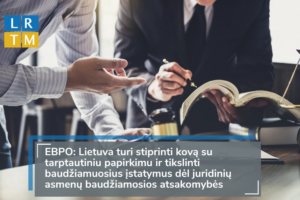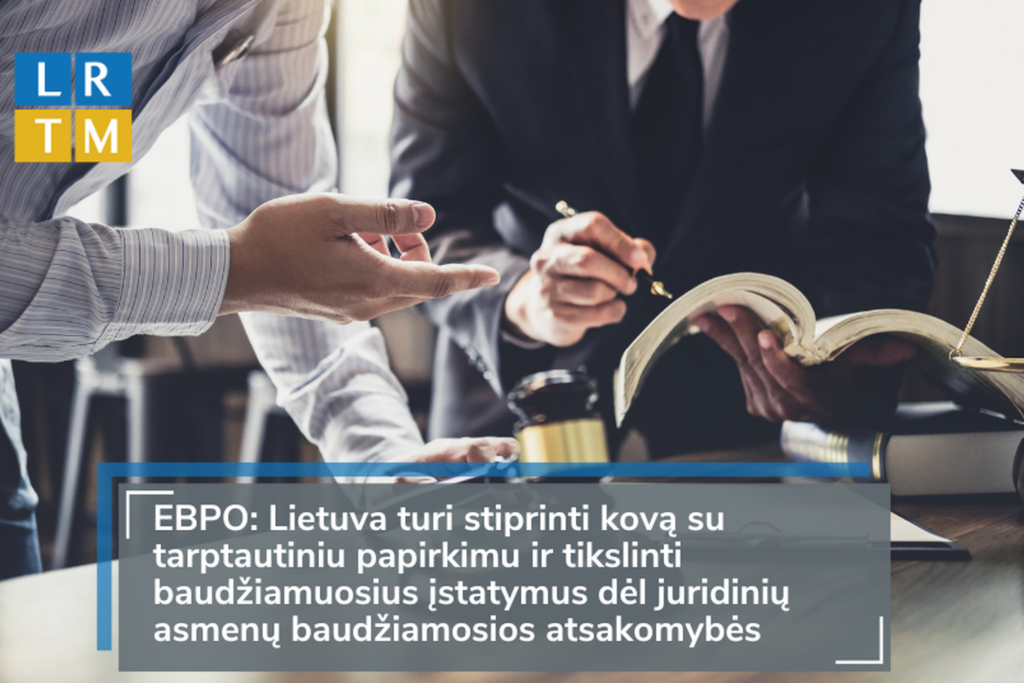Lithuania must strengthen the fight against international bribery and revise the criminal laws regarding the criminal liability of legal persons

Lithuania has an effective legal and institutional framework to fight corruption, and its efforts to digitize criminal proceedings are welcome, but Lithuania still has not convicted a single person or company for possible corruption abroad, according to an OECD press release published today. The OECD Working Group on Combating Bribery of Foreign Officials in International Business Transactions, which consists of representatives of 46 world countries, approved the third-stage evaluation report for Lithuania, which reviews Lithuania’s efforts to combat bribery of foreign officials and provides recommendations for the necessary further actions. The report positively assesses Lithuania’s efforts to fight corruption.
The active role of our country
The active role of our country in carrying out anti-corruption education and informing the public about international bribery is noted. Digitized and faster procedures for requests for legal assistance and information requests from financial institutions, the establishment of a register of final beneficiaries, the requirement for certain companies to provide information on anti-international bribery measures in their annual report are welcomed. “OECD recommendations are very timely and extremely important for improving our country’s legal and institutional systems for combating bribery of foreign officials when concluding international business transactions.
In order to achieve an anti-corruption breakthrough
In order to achieve an anti-corruption breakthrough, it is important to ensure more effective processes for the application of sanctions, confiscation of assets, investigations and prosecutions. It is clear that we are positively evaluated by the OECD experts as we follow the path of change. The creation of the Register of Beneficiaries of Legal Entities, the approval of the 2022-2033 National Agenda for the Prevention of Corruption, the digitization of judicial processes, and the creation of sustainable legal and institutional mechanisms to combat the bribery of foreign officials, emphasized the Minister of Justice Ewelina Dobrowolska.
“The comments of the OECD experts are accurate and correct. Although our laws and institutional framework are largely prepared to combat sophisticated forms of corruption, including bribery of foreign officials in international business transactions, small details can undermine even the best efforts. We received valuable recommendations from foreign experts, which now need to be properly and quickly implemented,” says Jovitas Raškevičius, First Deputy Director of the Special Investigations Service, who participated in the defense of the Lithuanian report.
The main comments made in the report
The main comments made in the report of the experts who evaluated Lithuania: Although there is no such provision in the Criminal Code, Lithuanian courts in practice require establishing and proving the connection of the company’s owners (shareholders) with the criminal act committed by the company’s manager or employee in order for the company to be prosecuted. According to the OECD, such a clause does not correspond to the modern realities of corporate liability and is therefore not permitted under the OECD Recommendation against Bribery of Foreign Officials.
In practice
In practice, such a requirement will allow many companies to avoid liability for bribery abroad, so the OECD recommends Lithuania to immediately take amendments to the criminal law. OECD experts also recommend that criminal laws provide for the possibility for the court to take into account the company’s anti-corruption compliance program when mitigating criminal liability for a criminal act of a corrupt nature, and if such a program does not exist in the company – to provide for the obligation to implement it. It is worth developing faster and transparent mechanisms of pre-trial agreement with the accused legal person, so that criminal cases can be completed earlier without a conviction.
Although Lithuania has started pre-trial investigations
Although Lithuania has started pre-trial investigations into all cases where Lithuanian citizens or companies may have bribed state officials abroad, such cases were not investigated proactively enough and efforts were not made to gather as much evidence as possible in Lithuania, without waiting for legal aid responses from foreign institutions. The punishments imposed by the courts for criminal acts of a corrupt nature are still too lenient in practice. In addition, asset forfeiture against bribe payers is too infrequent and does not effectively recover the proceeds of transactions won through bribes. Experts are worried by the power and practice of the Seimas to often invite representatives of the prosecutor’s office and STT to participate in various meetings of the Seimas bodies, which may negatively affect the independence of the prosecutor and pre-trial investigation institutions and be perceived as an unauthorized pressure tool.
Despite the strong legal base
Despite the strong legal base and active anti-corruption education efforts, Lithuanian residents and companies still avoid reporting cases of corruption and are not sufficiently aware of measures to combat bribery of foreign officials. All state institutions – not only the Special Investigation Service – must be engaged in informing companies and residents about the threats of corruption abroad and applicable measures. It is proposed to improve legislation on the protection of whistleblowers and the duty of civil servants to report cases of corruption. Lithuania ratified the OECD Convention on Combating Bribery of Foreign Officials in International Business Transactions in 2017, joining the OECD, and undertook to actively prevent bribery of Lithuanian citizens or companies abroad. The evaluation report of the third stage of Lithuania approved by the OECD working group contains a total of 49 recommendations, which Lithuania will have to implement within two years and report to the OECD working group.

